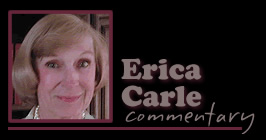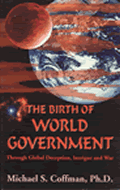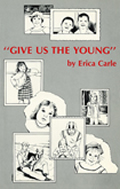Erica
Carle
July 26, 2009
NewsWithViews.com
We have to know something about game theory to understand what is going on in the world today. If games are so important that in 1994 John Forbes Nash, Jr. was awarded a share of the Nobel Prize in Economics for his work on Game Theory, something significant is happening and we ought to know about it. In 2001 a movie called, "A Beautiful Mind" based on the life and work of Nash was released. It won four Academy Awards. However, it gave one very little understanding of Game Theory and its purpose.
I first heard about the Theory of Games from an article titled, "A Theory of Strategy" by John McDonald. In the June, 1949 issue of FORTUNE magazine. Around the same time in 1976 when I came across the article, Milwaukee was experiencing the school busing controversy. I connected the two and wrote about it beginning in the June 23, 1977 issue of WISCONSIN REPORT.
The Theory of Games is more important today than it was in the seventies. Since I believe the idea of Game Theory will be easier to understand if explained by example I will go back to the 1977 article to explain how Game Theory was used to put across the much-hated busing in the Milwaukee area.
FROM: "Are We Playing Games?" WISCONSIN REPORT 6/23/77
One of the most popular activities in colleges, at seminars, workshops, sensitivity sessions, industrial and sales training courses, etc. is participation in what have been called, 'simulation games'. What is it all about? Are the tricks learned in simulation games intended to be carried to life situations? Are we all playing games?
If we are playing games we ought to know it. Otherwise, how can we win? Winning games requires strategy. Developing strategy requires thought. Effective thought requires knowledge. Acquiring knowledge requires effort. If we try to play games without effort, knowledge, thought and strategy, we probably will loose. So the questions that need to be answered are:
(1) ARE WE PLAYING GAMES?
Yes. Mathematicians, sociologists, economists, and political technicians are now trying to direct human action by using what mathematicians call the, ' Theory of Games.' FORTUNE, June 1949 explained:
"The theory of games is essentially a theory of strategy. It concerns the elusive nature of the constant thread of opposition and conflict that runs through various interrelationships of men, from the striking of a bargain in the market to the dread clash of war. It has none of the naïveté popularly associated with longhairs. It is more avant-garde than Sartre, more subtle than a Jesuit, and as honest as one can safely be. Although deeply involved in the mysteries of value, it is formal and neutral. Mathematics, qua mathematics, doesn't take sides."
(2) WHAT DOES IT MEAN?
It means many things: First, the managers have finally realized that if they want a world management system it cannot be based on the hope of ever achieving peace. They are willing to acknowledge among themselves that 'altruism' is out. World management must be based on the idea of conflict. It must be achieved by taking control of all conflict situations. Life itself must be considered to be a series of problems and conflicts.
Next, it means that total honesty can no longer be a virtue. Honesty is valuable only as a strategy. If it does not further one's purpose to be honest, honesty has to be abandoned.
It is
'formal' means that certain procedures (rituals) have to be followed to
make the theory valid.
The theory does not apply to totally random activity. Conflict situations
have to be 'formalized.'
'Neutral' means that while values will be taken into account, the theory of games, being mathematical, treats all values as neutral. A conflict of values is permissible, but moral principles are not. Within the formality of the game one may be expected to exchange moral principles for strategic advantage if it appears a gain can be made. The only 'sin' would be getting caught in a strategic error.
The FORTUNE article tells much more, but for the present, let's see how knowledge of the theory of games helps explain everyday events:
IBM – The Power Game
HEADLINE: "Career Game Rules Spelled Out" MILWAUKEE SENTINEL, 3/5/77
The story concerns Lillian Davis, an employee of International Business Machines (IBM):
"Power is the goal." Lillian Davis is interested in power, and she's not afraid to say so. "You can't take it too seriously, but it's a game, and it's fun to play," she added.
Miss Davis is a regional manager of equal opportunity programs for the General Systems Division of IBM, and was the keynote speaker at a conference on Women in Business at the UW-Green Bay.
Miss Davis had many instructions for women, (ERICA CARLE NOTE: none of which it seems centered on doing a good conscientious job and respecting other people). Rather, it was all advice for pushing oneself ahead in the 'system':
"Figure out the rules of the game, and then play the game . . . You have to be assertive . . . You would not be considered serious about a career if you could not move . . . Evaluate a person on the amount of power he or she holds, not on the basis of personality , , , Acquaintance with those who have power has obvious rewards . . ."
She couldn't have sounded more IBMish had she taken her instructions from the 'Old Man' himself, Thomas J. Watson, Sr.
Miss Davis appears to be blissfully unaware of the fact she is being used to gain power for IBM, not herself. She is just one, among many IBM-owned sheepdogs barking other pliable ones into the 'system.'
CONFLICT: The Busing Game
HEADLINES:
1-
"Tempers Flare at Busing Talk" MILWAUKEE JOURNAL, 6/21/77
2- "Busing Idea Raked at County Hearing" MILWAUKEEE
JOURNAL, 6/21/77
3- "Parochial Pupils Treated Unfairly" MILWAUKEE
SENTINEL, 6/22/77
4- "Gronouski Won't Block 2nd Year of School Plan,"
MILWAUKEE JOURNAL, 6/22/77
The busing situation is one of the prime examples of game playing. The objects of busing were first, to achieve a game situation—conflict; second, to gain power for the IBM and HARMS planners over students, parents, teachers, administrators, schools, and businesses in the community.
Busing is being used to promote the career education caste system by which IBM/HARMS/Carnegie/Chamber of Commerce planners hope to ease all the people of the world into global corporate 'tribes.'
Many blacks, who once thought busing was meant to benefit them, are beginning to recognize that there was no such intent. Busing is a play for power and profit, pure and simple. Busing is a game!
POKER & The Theory of Games
Its contriver, John von Neumann, constructed his Theory of Games largely on strategy used in the game of Poker. Bluffing is one of the strategies of Poker. It is also an important strategy in the real-life Busing Game. How bluffing is used was explained in the FORTUNE article on the Theory of Games.
BLUFFING
Of the two possible motives for Bluffing, the first is the desire to give a (false) impression of strength in (real) weakness; the second is the desire to give a (false) impression of weakness in (real) strength. Both are instances of inverted signaling . . . of misleading the opponent. It should be observed, however, that the first type of Bluffing is most successful when it succeeds, when the opponent actually passes, since this secures the desired gain; while the second is most successful when it 'fails,' when the opponent 'sees,' since this will convey to him the desired confusing information . . .
The basic good strategy must be always to bet high on a high hand and mostly low on a low hand, "but with occasional, irregularly distributed Bluffs."
THE BUSING BLUFF
In the case of busing, the 'Bluff' was to give a false impression of strength from a weak legal position. The troops came out in force to intimidate parents and teachers. The Metropolitan Milwaukee Association of Commerce said, "Cooperate. We don't want to have a 'Boston.;" Ministers and priests were organized, and ready to shame their flocks into the trap. PTA's pitched right in to help 'educate' parents and teachers. The HARMS-controlled League of Women Voters gave their usual assent. The University urban affairs crowd gleefully participated. Uninformed lawyers talked about the U.S. Constitution with pious hypocrisy, and urged Milwaukeans not to waste time and money fighting a losing legal battle. The school board began dealing with a 'special master' appointed by a federal judge.
Many parents were full of fight at first, but when they realized that to fight might mean some personal and financial sacrifices on their part, they decided to cave in, and let their children suffer the consequences. Suburban school boards, like Wauwatosa's, also caved in. They ignored the people and played the game.
PASS . . . With a Strong Hand
They didn't know the managers were bluffing. Parents could have held the high ground. School boards could have been true to the trust placed in them. All they needed to do was study, and learn, and work, and show some personal courage by ignoring the Chamber of Commerce and the League of Women Voters. They threw down a winning hand.
A NEW BUNCH OF FELLOWS
Just how weak the position of the IBM/HARMS/Carnegie/Chamber of Commerce coalition is becomes apparent with the following information from IBM's THINK, March/April, 1970. The article is titled, "Each Year, A Brand New Bunch of Fellows."
The following is quoted from that article:
"Back in 1964, President Lyndon B. Johnson expressed concern over the widening chasm between government and young leaders. He asked some of the best minds around what to do about it, and one of the ideas—it came from John W. Gardner, then president of the Carnegie Corporation—really grabbed LBJ's imagination. The idea was to search about for young people who showed outstanding career promise in business, the professions, scholarship, journalism, local civic leadership, and bring them to Washington to learn about government's problems by working as personal staff assistants to Cabinet officers and White House advisers. The idea was not to keep them in Washington, but to send them home after a year and replace them with a new crop; not a talent raid of local communities, by Big Government, but enrichment if individuals by giving them an extraordinary opportunity to broaden their experience.
PARTNERS?? ADVENTURE??
"Now, as never before, the landscape is dotted with young leaders in local government and private industry who know how to engage federal government as a partner—they have worked both sides of the street . . .
"Fellows are free to be original.
"Take, for example, an adventure cooked up by Lelewer at HEW and his counterpart at the Department of Justice, David Miller, whose Fellowship year of 1968-69 straddled the Johnson and Nixon Administrations.
"'We decided,' recalls Lelewer, 'that one contribution we might make to the incoming Administration was to try to provide some new insights into the problems of school desegregation, which we knew each of our new Secretaries would have to face.' They arranged to visit school districts threatened with cutoff of federal education funds—one in the North, a suburb of Detroit, and several in the south—to see 'what was happening at the other end.' The fellows talked with teachers and parents, black and white, and with elected officials, some of whom had lost reelection as reprisal for appearing to cooperate with federal officials . . .
GIVE US A COURT ORDER
""When our talks got really frank, we found that what they wanted was a court order, getting a federal judge to say, 'You can't do this, you've got to do that.' Then they felt they could achieve school desegregation as required by law—and still get re-elected.'
"Returning to Washington, the pair of Fellows briefed Secretary Robert Finch and Attorney General John Mitchell, orally and in writing. In a short time, the Administration launched a new policy of emphasizing court orders in desegregation cases rather than abruptly cutting off subsidies to districts. [*8] 'I'm not going to say, Lelewer points out, ;that our findings were the only input that led to the new policy, but I know we were listened to seriously, not because we were experts, but because we had done some hard digging and were viewed as very objective.'
So, you see, court-ordered busing has nothing to do with the U. S. Constitution, or with Constitutional laws. Court-ordered busing is the GAME STRATEGY of a bunch of Fellows in the Department of Health Education and Welfare and the Justice Department.
Game playing requires the elimination of moral principles. Moral principles are replaced by strategies. Therefore all remnants of Christianity and the Ten Commandments must be removed from public policy. The U. S. Constitution is used only when it is good strategy to do so. To enforce busing for integration federal judges became game players.
Learn to recognize game players. Tell them you are aware that they are playing games, but that you do not play games. Force them to be honest. Force them to reveal themselves and their goals.
[*8] FEDERAL JUDGES TOLD HOW TO HANDLE DESEGREGATION CASES -- About 20 federal district judges from around the country are meeting in Washington, D.C., this weekend in closed sessions to discuss school desegregation cases and how to handle them. At least three of those invited are among judges now involved in desegregation litigation...
|
Subscribe to the NewsWithViews Daily News Alerts! |
The seminar is being held at the Federal Judicial Center, the research and training arm of the federal judiciary, but is being run by the Institute of Judicial Administration, a private organization at New York University. MILWAUKEE JOURNAL , October 4, 1975.
Read Erica Carle's books: Why Things Are The Way They Are. and "Give Us The Young"
� 2009 Erica Carle - All Rights Reserved
Sign
Up For Free E-Mail Alerts
E-Mails are used strictly for NWVs alerts, not for
sale
Erica Carle is an independent researcher and writer. She has a B.S. degree from the University of Wisconsin. She has been involved in radio and television writing and production, and has also taught math and composition at the private school her children attended in Brookfield, Wisconsin. For ten years she wrote a weekly column, "Truth In Education" for WISCONSIN REPORT, and served as Education Editor for that publication.
Website: EricaCarle.com
E-mail: hist.detective@yahoo.com















